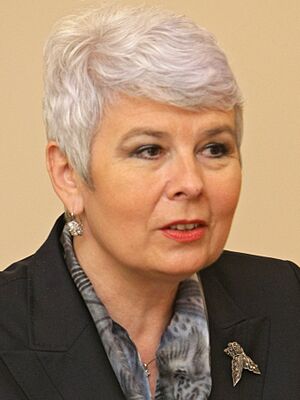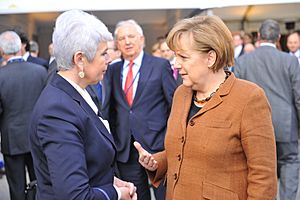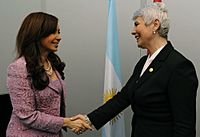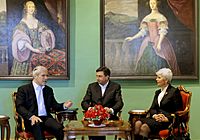Jadranka Kosor facts for kids
Quick facts for kids
Jadranka Kosor
|
|||||||||||||||||||||||||||||||||||||||||||
|---|---|---|---|---|---|---|---|---|---|---|---|---|---|---|---|---|---|---|---|---|---|---|---|---|---|---|---|---|---|---|---|---|---|---|---|---|---|---|---|---|---|---|---|

Kosor in 2010
|
|||||||||||||||||||||||||||||||||||||||||||
| Prime Minister of Croatia | |||||||||||||||||||||||||||||||||||||||||||
| In office 6 July 2009 – 23 December 2011 |
|||||||||||||||||||||||||||||||||||||||||||
| President | Stjepan Mesić Ivo Josipović |
||||||||||||||||||||||||||||||||||||||||||
| Deputy | Slobodan Uzelac Božidar Pankretić Darko Milinović Domagoj Ivan Milošević Petar Čobanković Gordan Jandroković |
||||||||||||||||||||||||||||||||||||||||||
| Preceded by | Ivo Sanader | ||||||||||||||||||||||||||||||||||||||||||
| Succeeded by | Zoran Milanović | ||||||||||||||||||||||||||||||||||||||||||
| Minister of Family, Veterans' Affairs and Intergenerational Solidarity | |||||||||||||||||||||||||||||||||||||||||||
| In office 23 December 2003 – 6 July 2009 |
|||||||||||||||||||||||||||||||||||||||||||
| Prime Minister | Ivo Sanader | ||||||||||||||||||||||||||||||||||||||||||
| Preceded by | Ivica Pančić | ||||||||||||||||||||||||||||||||||||||||||
| Succeeded by | Tomislav Ivić | ||||||||||||||||||||||||||||||||||||||||||
|
|||||||||||||||||||||||||||||||||||||||||||
| Personal details | |||||||||||||||||||||||||||||||||||||||||||
| Born | 1 July 1953 Lipik, PR Croatia, FPR Yugoslavia |
||||||||||||||||||||||||||||||||||||||||||
| Political party | Independent (2013–2015; 2015–present) | ||||||||||||||||||||||||||||||||||||||||||
| Other political affiliations |
SKH (until 1990) HDZ (1995–2013) Successful Croatia (2015) |
||||||||||||||||||||||||||||||||||||||||||
| Spouses |
|
||||||||||||||||||||||||||||||||||||||||||
| Children | 1 | ||||||||||||||||||||||||||||||||||||||||||
| Parents |
|
||||||||||||||||||||||||||||||||||||||||||
| Alma mater | University of Zagreb | ||||||||||||||||||||||||||||||||||||||||||
| Signature | |||||||||||||||||||||||||||||||||||||||||||
Jadranka Kosor (born 1 July 1953) is a Croatian politician and former journalist. She served as the Prime Minister of Croatia from 2009 to 2011. She became Prime Minister after Ivo Sanader resigned. Kosor was the first and only woman to be Prime Minister of Croatia since the country became independent.
Before entering politics, Kosor worked as a journalist after studying law. During the Croatian War of Independence, she hosted a radio show that helped people dealing with war-related issues. In 1989, she joined the Croatian Democratic Union (HDZ) party. She quickly became an important member.
In 1995, she was elected to the Croatian Parliament. Later, she became a minister in the government, focusing on family and veterans' affairs. In 2005, she ran for president but did not win. When Prime Minister Sanader resigned in 2009, Jadranka Kosor took over as Prime Minister and also became the leader of her party.
As Prime Minister, Kosor worked to improve Croatia's economy during a difficult time. She also strongly fought against corruption and organized crime. Her efforts led to many investigations into wrongdoing by powerful people, including some from her own party. She also played a key role in helping Croatia join the European Union. On 9 December 2011, she signed the agreement for Croatia to join the EU.
After her party lost the 2011 election, Kosor left her role as Prime Minister. She continued to be active in politics for some time. In 2021, she received a high award from the President of Croatia for her contributions to the country.
Contents
Early Life and Career
Jadranka Kosor was born in Lipik, Croatia. She finished her primary school in Pakrac. She moved to Zagreb to study law at the University of Zagreb.
She started her career as a journalist in 1972. She wrote for Večernji list and worked for Radio Zagreb. During the Croatian War of Independence, she hosted a radio show that focused on helping refugees and disabled war veterans. She also worked briefly for the BBC.
Political Journey

In 1995, Jadranka Kosor became a member of the Croatian Parliament for the Croatian Democratic Union (HDZ) party. She also served as the vice-president of the Parliament. From 1999 to 2000, she led the HDZ's Women's Association. She helped more women become candidates for the party in the 2000 elections.
Kosor was the vice-president of the HDZ party from 1995 to 1997, and again from 2002 to 2009. In 2003, she became a minister in the Croatian government. Her role was to oversee family, veterans, and inter-generational affairs.
In July 2009, she became the leader of the Croatian Democratic Union party. This happened after the previous leader, Ivo Sanader, resigned.
Leading the Government
On 1 July 2009, the Prime Minister of Croatia, Ivo Sanader, suddenly resigned. He suggested Jadranka Kosor as the next Prime Minister. With support from other political parties, Kosor was asked to form a new government.
On 6 July, the Croatian Parliament approved her new government. Jadranka Kosor became the first female Prime Minister of independent Croatia.
Domestic Policies


When Kosor became Prime Minister, Croatia faced economic challenges like high unemployment. She introduced an emergency budget to reduce government spending and national debt. This included a new income tax and a small increase in the sales tax. These changes were meant to help the country's finances.
Her government also took a strong stand against corruption. Many public officials were investigated for wrongdoing. This effort was praised by some who felt the government was finally fighting corruption. However, others pointed out that many of the people investigated were from Kosor's own party.
In 2010, the economy remained a big concern. Jobs were lost, and people spent less money. The government tried to make labor laws more flexible, but unions strongly opposed this. They gathered many signatures for a public vote, and the government eventually dropped the proposed changes.
Foreign Relations
Jadranka Kosor worked closely with the Prime Minister of Slovenia, Borut Pahor. In November 2009, they signed an agreement that helped solve a long-standing border dispute between their countries. This agreement was important because it allowed Croatia's talks to join the European Union to continue.
On 9 December 2011, Prime Minister Kosor and President Ivo Josipović signed the official agreement for Croatia to join the EU in Brussels. This was a major achievement for Croatia.
Public Opinion
During her time as Prime Minister, Jadranka Kosor's public support changed. After she took strong actions against corruption, her approval ratings went up. At one point, her support reached 77%. However, as economic problems continued, her approval ratings later decreased.
After Being Prime Minister
After her party lost the 2011 election, Jadranka Kosor handed over power to the new Prime Minister, Zoran Milanović. She continued to serve as a member of the Croatian Parliament. She also became the Deputy Speaker of the Parliament.
Kosor ran for the leadership of her party in 2012 but did not win. She sometimes disagreed with the new party leadership. In 2013, she was removed from the HDZ party.
After leaving the HDZ, Kosor continued her political work as an independent politician. She became known for her more liberal views on certain social issues. She is very active on Twitter, where she shares her thoughts on daily events and politics. She also writes a personal blog.
In 2023, she participated in Croatia's version of the TV show Masked Singer and reached the semi-final.
Personal Life and Achievements
Jadranka Kosor has one son, Lovro Škopljanac, who was born in 1984. He works at the Faculty of Humanities and Social Sciences, University of Zagreb.
She has published five books. Two of her books are poetry collections, and two are about the Croatian War of Independence. Her fifth book contains her comments on Croatian politics. Kosor has received several awards for her work as a journalist and for her humanitarian efforts. She is also an honorary member or president of several associations that support veterans and people with disabilities.
See also
 In Spanish: Jadranka Kosor para niños
In Spanish: Jadranka Kosor para niños
 | Sharif Bey |
 | Hale Woodruff |
 | Richmond Barthé |
 | Purvis Young |


